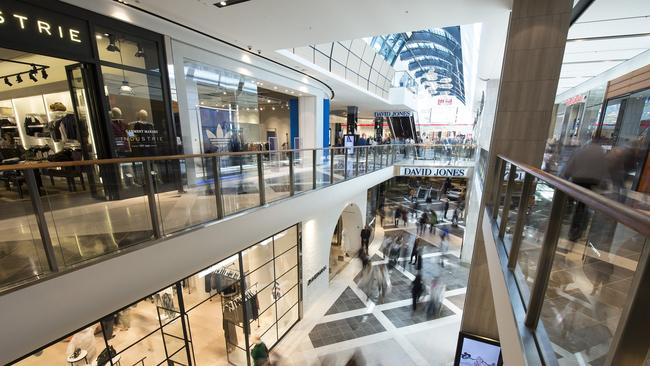AMP Capital real estate platform snagged by management turmoil
AMP is battling to keep control of the $28bn property unit that controls some of the country’s most prized assets as it is rocked by uncertainty about its CEO.

The AMP Capital property platform has emerged as a key battleground as the embattled funds manager attempts to keep nearly its $28bn portfolio intact in the face of instability at the head company.
The company was rocked by suggestions that AMP chief executive Francesco De Ferrari may depart and expectations that AMP and the suitor for a joint venture on its capital division, US group Ares Management, would opt to extend the deal’s exclusivity period.
Property players warned last night that if the Ares deal did not go ahead it would be difficult for the real estate platform to remain intact longer term as wholesale investors would seek out managers that could offer them certainty and its scale would diminish.
Pension fund clients had been impressed by the US group‘s commitments when they met as part of the prospective joint venture. But higher level management uncertainty has cast a shadow over the platform with questions over its future.
Ructions over the chief executive potential exit came as AMP Capital held meetings for its real estate investors, with the timing shaking confidence when the platform is already pressured.
Real estate is a flashpoint as the bulk of AMP Capital‘s assets are in Australia and NZ where it faces off against a deep pool of competitors with ambitions to grow property funds.
The fund manager has also made missteps including buying high priced retail property at the peak of the cycle and then later selling assets, partly to meet redemptions.
Some mandates have also rolled off, with institutions like Swiss Re likely to profitably exit its $1bn office and industrial portfolio, while local player Sunsuper is in the midst of transferring its $1.5bn mandate to Mirvac.
AMP Capital is also suffering staff losses with the chief financial office, real estate, Merran Edwards, understood to be departing to Lendlease.
The instability comes as superannuation fund investors in the property funds weigh up the future of at least two major vehicles that control about $12bn of property assets.
They are likely to want to hand control to longer term fund managers as property strategies often take years and hefty resources to fully realise.
Superannuation funds are concerned that the future of the real estate platform – which is considered one of the top property businesses in Australia – could be hit by changes outside its control.
The $5bn AMP Capital Diversified Property Fund is subject to a merger proposal by property group Dexus which would combine that vehicle with its own wholesale fund.
AMP Capital’s $7bn office fund is also under assault from rival managers, as the responsible entity weighs up launching a process via Jarden that could see a new group appointed to run the strongly-performing fund.
The Australian on Thursday revealed the group’s flagship at $3.6bn property shopping centre property fund lost $517m last year, a result in line with an industry that has been slammed by the coronavirus crisis amid challenging times for large malls.
While the company insists they are on the comeback trail this year their progress will be closely watched as rival managers may also seek out the management of this fund if the other two vehicles are lost.
The AMP malls are being managed partly to reorientate the focus of retailers towards more successful categories and the fund has also had good engagement with major department stores including Myer.
The business is also continuing to expand centres including Karrinyup in Perth and Marrickville Metro, where new stores are opening. It is also exploring mixed options at Sydney’s Macquarie Centre.
The fund, which owns stakes in landmark centres including Warringah Mall, Southland, Indooroopilly and Tea Tree Plaza, was once an industry stalwart but slashed valuations on its regional malls and also paid out investors fewer distributions.
The hit reflects the industry wide malaise in big malls, with its performance middle of the pack against similar vehicles run by rivals including Lendlease and GPT.
It slumped to a net loss after finance costs of $517 last financial year, a hefty dive on 2019’s $103.1m loss, blaming the COVID-19 outbreak.
“The resulting global travel restrictions, increased lockdowns in certain countries and restrictions on social gatherings are having an ongoing impact on both domestic and global economies, significantly impacting many Australian businesses and communities including certain businesses to which the group is exposed,” the fund accounts said.
Distributions to unit holders fell to $105m, down from $164.7m a year earlier.
The group had a current net asset deficiency at the end of December 2020 but refinanced shortly afterwards.
In February, its $450m syndicated bank debt facility maturing in May 2021 was refinanced. The facility limit was increased to $600m, with $300m maturing in February 2024 and $300m maturing in February 2026.
Valuations for the malls have stabilised and sales have lifted leaving the managers hopeful that the absence of major Covid outbreaks could drive capital growth in future, although few big malls have traded since the pandemic.
The fund has also completed the bulk of its negotiations with tenants affected by the pandemic and its redemption window is not open, so it is not dealing with exiting investors, which has weighed down the diversified fund.







To join the conversation, please log in. Don't have an account? Register
Join the conversation, you are commenting as Logout